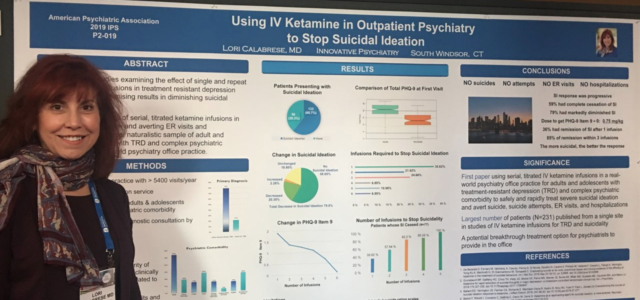Articles About Ketamine from Lori Calabrese, MD | The Ketamine Blog
Breakthrough anesthesia medicine proves life-changing for many who suffer from severe mood disorders.
In the last several years, a medicine began to emerge as a remarkable treatment for mood disorders. It was developed and FDA approved for anesthesia around 1970. Over 25 years later… it began to show its colossal hidden ability. What sort of ability? The power to relieve depression and other psychiatric disorders in a most dynamic way. Disorders like PTSD, bipolar depression, postpartum depression, addiction, social anxiety, and even eating disorders respond to this extraordinary treatment that involves a series of IV infusions. And perhaps the most remarkable of all, ketamine infusions can erase suicidal thinking in a few short hours. These articles about ketamine treatment are presented here to dispel stigma about psychiatric conditions and to give hope about treating them.
Early Testing was Cautious
Researchers tested it with trepidation 10-20 years ago. Then each study built upon the last. Their work revealed more insights about what actually causes depression, and how to treat it effectively. Never before has a medicine helped relieve symptoms in such a wide variety of people and their symptoms.
Researchers Still Learning All Ketamine Can Do
Ketamine works in multiple areas and systems of the brain. It improves the function of mechanisms that have been impaired by the stress of depression and anxiety. It helps the G proteins that pile up on lipid rafts in the cell membrane slide to off. This equips them so they can do their job enhancing signal transmission.
It also turns on the mRNA switch which in turn flips on DNA to build up brain-derived-neurotrophic-factor (BDNF). BDNF then causes synapse connections between neurons to proliferate in turbo mode, transforming and replenishing the connections between brain cells all around the brain, lighting it up with information, cognition, creativity, and insight.
There’s more that it accomplishes, like tamping down the cell bursting in the lateral habenula so you can experience the reward of pleasant moments. We don’t know what researchers haven’t discovered yet, but we look forward to hearing what’s next.
Ketamine Does More Than Bring Relief, It’s Transforming
The results of IV ketamine treatment are transformative. Those who have been weighted under a blanket of lethargic apathy and despair typically find they feel better and better after treatment. They often find they have the energy and motivation to dive into tasks they couldn’t face in recent memory.
More patients with treatment resistant conditions respond to ketamine than any other medicine available. It may sound odd, but the patients it helps the most are those who suffer the most from severe disorders. With continued research, neuroscience researchers and psychiatrists are learning methods of administration that help more and more patients enjoy a rapid and robust response,.
As a result, these individuals enjoy renewed hope. They express amazement at their energy for life and work, and an overall transformation in what they enjoy and are able to accomplish. They report a more balanced and joyful outlook, and the desire to rebuild and strengthen their relationships.
Ketamine is NOT for Everyone
With all the good IV ketamine treatment accomplishes, some people still don’t respond to it at all. The percentage of people who don’t respond is comparatively small, and we need to see more studies that can help explain why.
Why Ketamine Sometimes Doesn’t Work
There are others who have a significant response initially, then the response fades. One reason for that may be they have a deficiency of certain components in their blood. They may have a low folate level, or low testosterone, and some other deficiencies. In cases like this, sometimes replacing those nutrients helps that patient respond to ketamine treatment and experience resilience again. There are even cases where a patient’s blood levels are normal but the levels of certain components in their cerebral spinal fluid is low. By replacing that deficiency, the patient is able to enjoy a very positive and robust response to ketamine treatment.
Neuroscience is gaining knowledge by leaps and bounds in the 21st century. We hope to see more and more medicines that work as well as ketamine for those who have not yet been helped.
These articles about ketamine expand on those things we learn from neuroscience research in the labs, as well as those things we learn from research in our practice.

Welcome to November… this is the month each year we dedicate to thankfulness and gratitude. I’m going to share with you some experiences I’ve had this week with gratitude, suicide research scientists, and the AFSP. No matter where you are in life, no matter your circumstances…if you think about it..look around you…there is most likely […]
Continue Reading

Just think about it. How far reaching is this one condition? Sure people talk about being depressed with a casual tone. You get the feeling they feel crummy…but it seems to be their response to circumstances. And when circumstances change, they seem to forget they felt bad. But when you think about who’s affected by […]
Continue Reading

Sam Chaney walked up to the quiet car in the dark. It was a place by the lake frequented by teens for romantic interludes, or beer drinking. This car was dark. Silent. But running. He tapped on the window with a bit of anxiety. He’d just been reading about the teen suicide epidemic this morning. […]
Continue Reading

We’re smack in the middle of a couple weeks focused on the quest for improved treatments for depression and anxiety. This past Thursday was World Mental Health Day, dedicated to raising awareness for mental health …and this year’s efforts were focused on “40 seconds of action” to help reduce the risk of suicide. Because every […]
Continue Reading

I just returned from the annual meeting of the American Psychiatric Association’s Institute for Psychiatric Services: Mental Health Services Conference, in NYC. This conference was presented in collaboration with the World Psychiatric Association. The World Psychiatric Association represents 120,000 psychiatrists in 120 countries. The heart and focus was that innovation and collaboration improve access to […]
Continue Reading

“IV Ketamine treatment…? I can’t afford that.” “Sure, I want to feel better. I’ve tried so many medicines and treatments. I don’t even know what it’s like to enjoy something, anything…or to feel happy. I don’t have the energy to even get out of bed half the time, much less get anything done. But…the cost […]
Continue Reading

The Importance of Meeting Together Every once in a while — sometimes only once or twice in a physician’s career — a medicine or treatment comes along that’s a game changer. Something that sets its own records, raises its own bar, and helps people so profoundly that their lives are better because of it. A […]
Continue Reading

What is a suicidal person like? How do you find help for a suicidal person? Can you describe the profile of someone who wants to die? Are they melancholy? Irritable or agitated? Are they funny? Always making people laugh when they’re dying inside? Do they present themselves one way in public and another way in […]
Continue Reading

Today marks the beginning of National Suicide Prevention Week 2019, and tomorrow, September 10, is World Suicide Prevention Day. More than just observing a day or week like this, let’s use the opportunity to learn what we can actually do to make a real difference in the life of someone who suffers from suicidal thoughts. […]
Continue Reading

September is National Alcohol and Drug Addiction Recovery Month 2019, and as we celebrate and support everyone in recovery, let’s also talk about what might help others who are trying…to actually get there. “r” is for recovery whether you seek recovery or are actively working your recovery every day. Addictions can involve alcohol, opioids, other […]
Continue Reading









